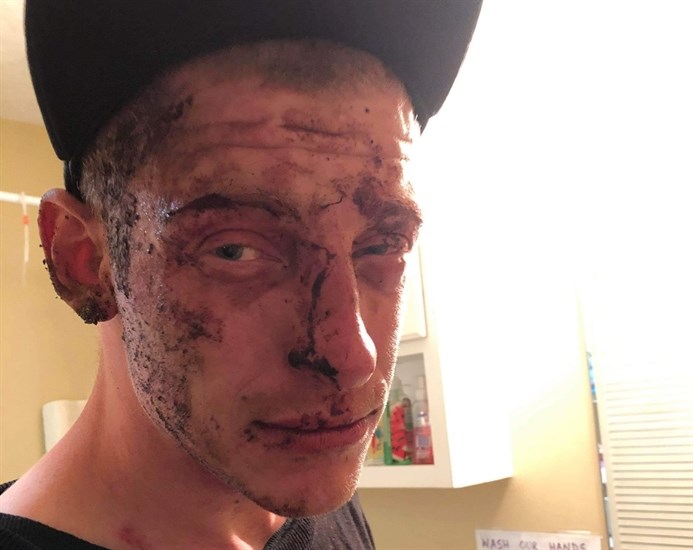
Tyler Russell
Image Credit: SUBMITTED/ Bridge Law Corporation
July 16, 2020 - 6:00 PM
Recent videos of RCMP violence in Kelowna have cast a spotlight on that police force’s behaviour when dealing with difficult members of the public.
They came to light around the same time as protests and riots have focused on issues of racism and violence in police forces across North America and beyond.
The Vancouver Police Department – which pioneered some of the de-escalation and mental health training that is now a requirement for all police officers in B.C. – cast a different light on police work during a news briefing today, July 16.
“What the research shows is that, in the overwhelming majority of times, we gain voluntary compliance from people just by showing up and talking to them,” Sgt. Brad Fawcett said. “It’s an infinitesimally small number of times where we’re unable to gain compliance.”
In only 0.08 per cent of the 270,000 calls Vancouver police respond to each year are physical force or weapons required.
Out of those 270,000 calls there were only 224 "admissible complaints" filed and 11 were substantiated.
While the Vancouver Police Department is not the RCMP, those statistics are intended to show that violence and misbehaviour by police is rare.
In one of the Kelowna videos, a police officer is seen punching Tyler Russell several times before he’s subdued and arrested. Russell is suing the RCMP over the assault.
READ MORE: Man seen on video in violent Kelowna arrest sues RCMP officer
Kelowna RCMP responded to more than 60,000 calls for service last year so, like the Vancouver Police Department, incidents involving violence make up a very small proportion of their actions.
The second video shows UBCO student Mona Wang being dragged down a hallway, handcuffed, after RCMP were called to do a wellness check. Wang is also suing the police.
READ MORE: iN VIDEO: RCMP investigating Kelowna officer caught on video dragging nursing student
The Vancouver Police Department pioneered various programs to deal with mental health calls and say they have shown those to be effective.
Sgt. AJ Bennefield said that 20 per cent of Canadians live with mental illness.
“We’ve effectively cut in half the rate that mental health is a component of incidents from 31 per cent in 2007 to 16 per cent in 2019,” she said.
They do have a program, called Car 87, where a police officer and a trained health professional team up to respond, in part, to emergency calls. That’s similar to the Police And Crisis Team in Kelowna and Car 40 in Kamloops. One main difference is that, in the Vancouver model, the police officer is not in uniform and the car used is unmarked.
Bennefield did not have any statistics available on how many calls the Car 87 teams deal with or what proportion of incidents involving mental heath they participate in.
While that team deals with more immediate situations, other programs that are made up mostly of health professionals work to help the mentally ill connect with resources they need or to get hospitalization if necessary. That has helped cut down on situations that escalate into violence or confrontations with police.
Bennefield could not provide statistics on how many wellness checks the Vancouver Police Department responds to but estimated it ranged between 50 and 100 per week.
“In terms of dealing with wellness checks, the priority is the information that we’re getting,” she said. “What is the nature of the check? Is this person elderly? Are they sick? Is this person suicidal? It changes the dynamic and it changes how the approach is made. Ultimately, the goal is to ensure that the person is safe and to check on their wellness.”
All police officers in B.C. are required to take a two-week course on de-escalating crises with a focus on dealing with mental health issues.
While that was pioneered by the Vancouver Police Department, the province now requires it of all police officers, including the RCMP.
READ MORE:Combining police with nurses for mental health calls isn't new; B.C.'s first came in 1978
During basic training, all new RCMP recruits have a module that focuses specifically on mental health, Staff Sgt. Janelle Shoihet, the senior media relations officer for the RCMP in B.C., said in an email
It includes a discussion on mental illness and emotionally disturbed people along with a presentation from an outside person who talks about how they interacted with police during a mental health crisis.
Paid actors are also brought in to role play different situations with the aid of mental health professionals.
Since 2016 there has been a mandatory three-hour on-line de-escalation course that RCMP officers have to take. This is in addition to specialized training various teams undergo.
To contact a reporter for this story, email Rob Munro or call 250-808-0143 or email the editor. You can also submit photos, videos or news tips to the newsroom and be entered to win a monthly prize draw.
We welcome your comments and opinions on our stories but play nice. We won't censor or delete comments unless they contain off-topic statements or links, unnecessary vulgarity, false facts, spam or obviously fake profiles. If you have any concerns about what you see in comments, email the editor in the link above.
News from © iNFOnews, 2020